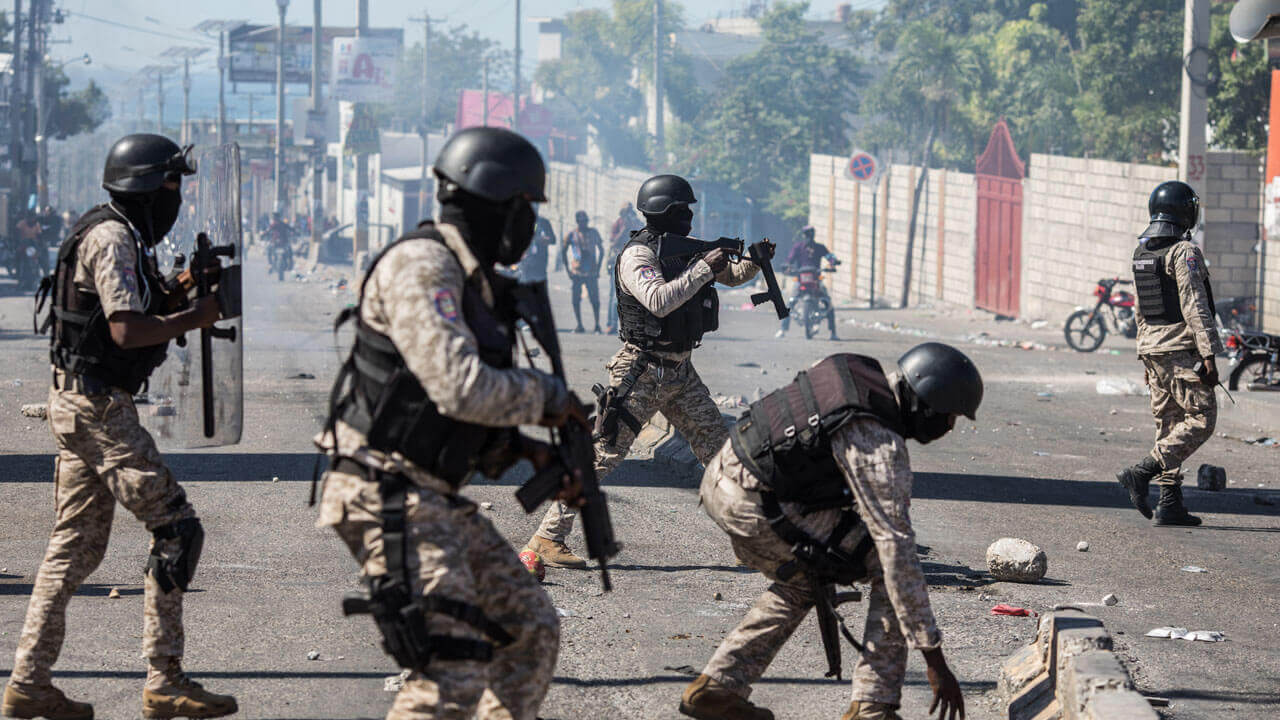Violence and political instability are on the rise in Haiti, as protesters and political opposition step up their demands for President Jovenel Moïse to step down, arguing that his five-year term ended on February 7, 2017. Moïse, meanwhile, has remained steadfast in his refusal to resign, alleging an attempted coup on his presidency as well as an “attempt on [his] life”, insisting that he is “not a dictator”. His comments are unlikely to be received well, particularly after police arrested 23 people over the weekend on charges of plotting a coup and the murder of the president.
The opposition contends that Moïse’s five-year term ended on February 7, 2021 because his predecessor Michel Martelly’s term expired in February 2016. The President, however, argues that his term actually began in February 2017, since his inauguration was delayed by a year, during which Haiti was ruled by a provisional president due to severe mismanagement of the electoral process.
While the ruling PHTK party may argue that Moïse was elected into office with over 50% of the votes and thus holds the support of the majority of the country, voter turnout only stood at 21%.
Since dissolving the parliament in January 2020, Moïse has been accused of corruption, after he and others of his administration were accused of embezzlement of funds. At the same time, he has also been criticised for political suppression, particularly after he said that “robbery, arson, and blocking public roads” would now be termed as terrorism. Furthermore, he established a parallel intelligence agency that “answers only to the president”, and has also restricted the influence of the courts.
The legitimacy of Moïse currently rests on shaky ground, given that he is leading by decree, since Haiti was unable to hold legislative elections in October 2020 due to “widespread unrest and a crippling economic crisis.” Consequently, most lawmakers’ terms have expired. In fact, parliamentary elections were originally scheduled for October 2019, but could not be conducted due to “political gridlock and protests” that caused schools, businesses, and many government offices to shut down businesses, and many government offices to shut down.
The Haitian leader has also drawn criticism for attempting to introduce constitutional amendments that will introduce forced conscription for citizens above the age of 18, create a vice-presidential position to replace the prime ministerial post, and implement a unicameral legislature that is elected every five years as opposed to the current Senate and Chamber of Deputies. A referendum will be held on these matters on April 25.
Moïse has repeatedly said that he will step down in February 2022 and reassured the public that legislative and presidential elections will be held on September, and a run-off election on November 21.
Against this backdrop, Moïse made a speech from the Port-au-Prince airport, where he said that there was an “attempt on [his] life” that was part of coup attempt that has been planned since November 20. His unfounded claims were reiterated by Prime Minister Joseph Jouthe, who claimed that security forces had uncovered a number of weapons, and Justice Minister Rockefeller Vincent, who said that authorities had intercepted an “attempted coup d’état”. The pair appeared to place the blame at the feet of the opposition, who has backed either Yvickel Dabrézil or Joseph Mécène Jean-Louis, both of whom are Supreme Court judges, to become the transitional president of Haiti. In fact, authorities arrested Dabrézil after allegedly finding a speech he had prepared in case he was named as the interim leader. Likewise, Jean-Louis accepted the opposition’s nomination to become the interim leader.
Following the multiple arrests over the past few days, opposition leader André Michel called for the president to be arrested and Dabrézil to be released.
The previous United States (US) administration, led by President Donald Trump, appeared to offer some form of support for Haiti’s opposition, with erstwhile Secretary of State Mike Pompeo saying on January 15: “Haiti’s legislative elections are now overdue. We continue to call for elections as soon as technically feasible. We understand that the Organisation of American States (OAS) secretary-general has called for those elections to be held by the end of January.” However, the US continues to recognise Moïse as the legitimate leader of Haiti, and this point was reiterated by the Biden administration, with US State Department spokesperson Ned Price saying that Washington believes his term ends in February 2022.
Therefore, political activists and opposition leaders will once again have to look inwards if they are looking to bolster support for their cause. Regardless of what happens, it seems all but certain that Haiti is set to endure a continued period of political, social, and economic strife.
In fact, the United Nations estimates that 133 people were killed during protests between October 2018 and December 2019, with 60 of them killed by the police, while the other 73 were largely killed by gang members. It appears that the current iteration of protests appears to be going down the same disastrous path. Given that roughly 60% of Haiti’s population makes less than $2 a day, the need for a swift resolution to this situation is of utmost importance.
Haiti Arrests 23, Including Supreme Court Judge, President Moïse Alleges Failed Coup
Security forces in Haiti arrested 23 people over the weekend, including Supreme Court judge Yvickel Dabrézil. President Jovenel Moïse said that authorities foiled an attempted coup.
February 9, 2021

IMAGE SOURCE: VALERIE BAERISWYL / AFPThe legitimacy of Moïse currently rests on shaky ground, given that he is leading by decree, since Haiti was unable to hold legislative elections in October 2020 due to “widespread unrest and a crippling economic crisis.”
